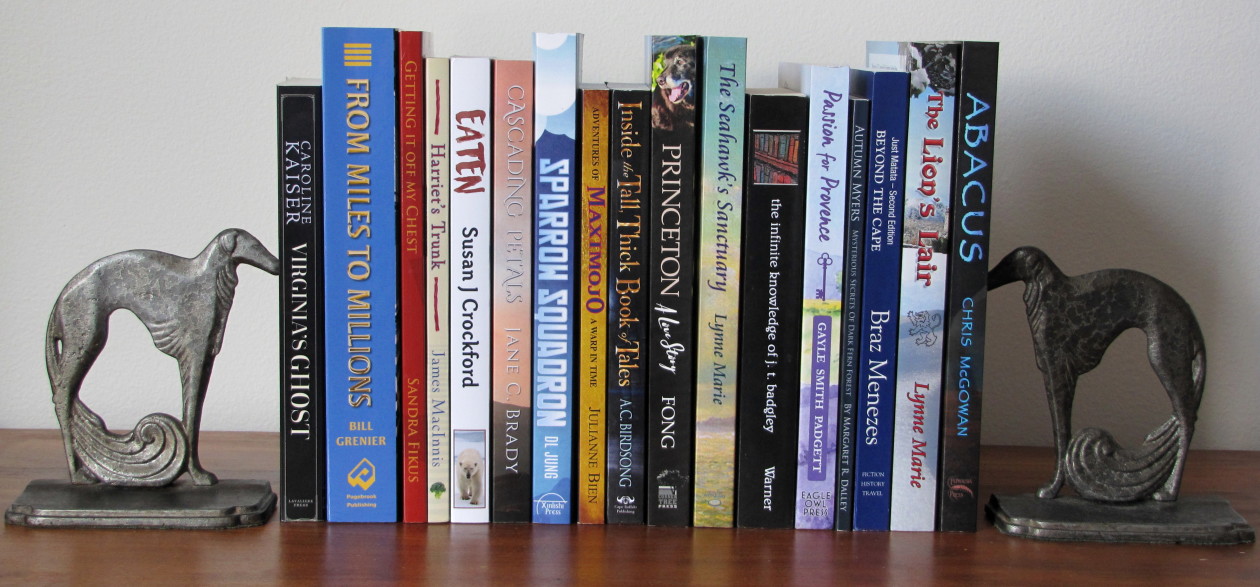When I was writing my novel Virginia’s Ghost and already thinking of ways to promote it, I felt intimidated by the notion of a Facebook author page. What would I post? I perused other author pages and noticed lots of posts on upcoming public appearances and detailed notes about the progress of books. That seemed all very well for high-profile authors with an established following, but no one knew who I was, so why would anybody give a fig if I announced I was on page 47 of my second draft?
Realizing my self-confidence was crumbling from dwelling on what the literary luminaries were doing, I resolved to find my own strategy. As a new and unknown author, I had to. I decided to focus on drawing people into the various themes of my book, which include antiques, auctions, the 1920s, art deco style, flappers, historical Toronto, and ghosts. I hoped that by posting little informative and entertaining tidbits on these themes–accompanied by appetizing visuals–I would arouse curiosity about the world represented in my novel.
Sometimes I deliberately made the connection for people between the images I posted and Virginia’s Ghost, but often not. I didn’t want the page to always be about my book, as I thought other people would find this narrow focus pretty tedious. And I especially didn’t want the page to become a platform for blatant self-promotion. I’ve seen far too many tiresome Facebook author pages that hammer people with one message: “Buy my book!!!” This looks amateurish (especially with all those exclamation marks), and my reaction to it is usually “No thanks.”
But because it was an author page, I obviously wasn’t going to neglect the subject of my book altogether, so I did and still do include posts about Virginia’s Ghost. When my book was in production (yes, I started a Facebook page months before I published), I posted the cover image and gave a few updates on how things were going during the design and proofreading processes. Now and then I post excerpts from the novel that are illustrated with some particularly appropriate image, or I chat briefly about where I’m at with the sequel. On rare occasions, I do some sort of giveaway that again puts my book briefly in the spotlight.
What I’m saying is that a wide variety of types of posts–a balanced approach–is critical to creating an interesting page. Personally, I prefer just a dab of promotion, and I like to be fairly understated about it. What I’m really keen on is connecting and engaging with people who like the same things I do because it’s just so much fun. I like being part of my own little tribe, and the bonus is that those who are in it might buy the book someday. But I don’t want to push it on them.
I tend to post several times a week (daily if possible), and I always aim for high-quality content. When I really put a lot of effort into writing a post and finding that perfect accompanying image, more people like and comment on it. A thoughtful post also consistently reaches a lot more people (for those who don’t know, Facebook informs you about how many people you’ve reached with each post). If you’re lazy and simply repost links to articles that have been making the rounds, especially without giving much additional commentary, you likely won’t receive much of a response. Effort and originality go a long way.
You can increase your followers by sharing your posts with like-minded Facebook groups. One of my favourites is Flappers and Bootleggers, a delightful group of people who are enthusiastic and knowledgeable about anything related to the 1920s. By posting art deco-era fashions and collectibles to this page, I have managed to acquire numerous new Facebook fans, many of whom regularly like and comment on my posts.
What I don’t recommend is succumbing to the allure of Facebook ads to attract new followers. I advertised for a week shortly after I launched my book last September, and while I did acquire the set number of new likes that Facebook had promised me (fancy that), few of the “likers” seemed legitimate. I don’t recall any of these people commenting on my posts, and when I looked at their profile pages, I found it impossible to imagine that they were the sort to be interested in my book. Where Facebook found these people is open to question, but my belief is that most of the likers had dormant accounts. It’s tempting to want to build your numbers quickly and easily through a Facebook ad, but you’re better off being patient and regularly offering compelling content that attracts the right people–the audience for your book.
Once you publish, countless people will come out of the woodwork to offer to take your money and help you flog your new book. The advantage of a Facebook author page is that it’s one of the few promotional activities you can do for free. It’s worth your while to put considerable effort into reaching your audience with a well-thought-out page. Don’t be afraid to express your unique personality through what you post, and don’t be intimidated by the process of creating a page. If you’re anything like me, you’ll ultimately come to see your Facebook page as a labour of love and have plenty of fun working on it. Enjoy the adventure!

 Follow
Follow